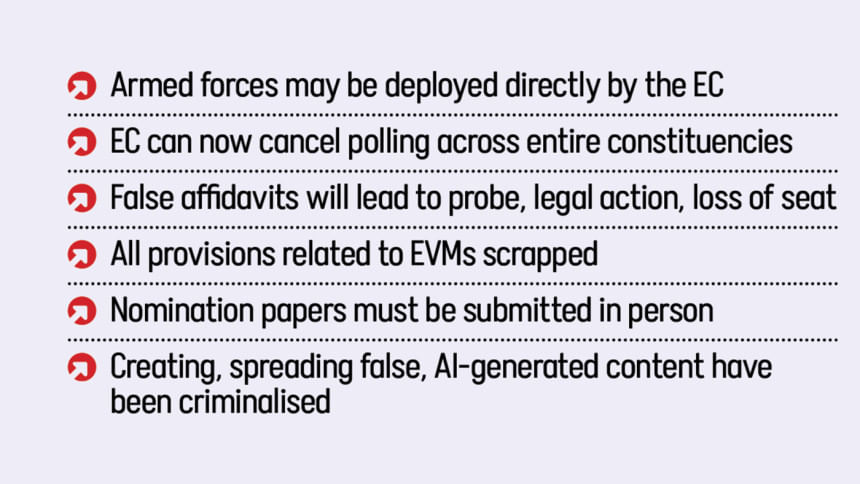RPO amendment: Alliance candidates must use their own party symbols

The advisory council yesterday approved major amendments to the Representation of the People Order, 1972, making it mandatory for candidates contesting polls under an alliance to use the symbol of their own party, not that of the coalition leader.The amendments also bar anyone declared a fugitive by a court from contesting elections, reintroduce the "no vote" option for single-candidate constituencies, and recognise the armed forces as law enforcement agencies during elections.Chief Adviser Prof...
The advisory council yesterday approved major amendments to the Representation of the People Order, 1972, making it mandatory for candidates contesting polls under an alliance to use the symbol of their own party, not that of the coalition leader.
The amendments also bar anyone declared a fugitive by a court from contesting elections, reintroduce the "no vote" option for single-candidate constituencies, and recognise the armed forces as law enforcement agencies during elections.
Chief Adviser Prof Muhammad Yunus chaired the meeting at his Tejgaon office.
Briefing reporters afterwards, Law Adviser Prof Asif Nazrul explained the change in rules for symbols of alliances. The move aims to give voters a clear idea of each candidate's party identity, he said.
In the past, smaller partners in alliances led by major parties like the Awami League and BNP were able to run under the larger party's symbol.
Contacted for comments over this amendment, BNP Standing Committee member Salahuddin Ahmed said his party opposed the change.
"From our side, we gave a proposal that this should not be changed. We think it should remain the same as before. If the small parties in an alliance cannot use the symbol of the big party, then there will be no meaning in being part of the alliance."
Asked about the amendments, Jamaat-e-Islami Secretary General Mia Golam Porwar said the changes would create problems for some parties.
The government and the Election Commission should have discussed with political parties and people before amending the RPO to ensure the reflection of their opinions in the amendment, he added.
At the briefing, Asif Nazrul said those who contest elections must, through an affidavit, provide the Election Commission with a complete statement of their income and properties, both at home and abroad.
"These details will be made public on the EC website so voters can know the sources and scale of their candidates' wealth," he said.
The amendments have empowered the Election Commission to cancel voting across an entire constituency if significant irregularities are detected. Previously, it could only cancel results at specific polling centres.
In constituencies with only one candidate, a "no vote" option will appear on the ballot. If "no vote" receives more support than the candidate, a fresh election must be held.
The option was last used in 2008 in such a way that included "no vote" on the ballots in each constituency regardless of the number of candidates. Around 3,82,000 people cast "no vote" at that time, but "no vote" did not win in any seat.
During the 2014 election, 153 lawmakers out of 300 were elected unopposed, as most of the opposition, including the BNP, boycotted the vote.
Earlier, 49 candidates nominated by the then ruling BNP were elected uncontested in the February 15, 1996 election, boycotted by the Awami League, Jatiya Party, Jamaat-e-Islami and other parties.
Citing the 2014 polls, Law Adviser Asif said, "It was a staged election. This type of election should not happen again."
As per the amendments, candidates providing false information in affidavits will face investigation even after taking oath. If found guilty, they may lose their parliamentary seat.
The new law criminalises the creation or spread of false or misleading content, including AI-generated materials, intended to harm a candidate, influence the election, or undermine electoral integrity. Offenders using bots, fake accounts, or synthetic media will face legal action.
The amendments restored a 2001 provision that defines members of the armed forces as law enforcers under the RPO. This allows their direct deployment by the EC, with the authority to arrest offenders within 400 yards of polling stations for offences related to polls or law and order.
The clause had been removed in 2009, though the army continued to serve as a striking force in subsequent elections -- for 13 days in 2024 and 10 days in 2018.
Through the amendments, online submission of nomination papers has been scrapped. Candidates or their proposers or seconders must now submit papers physically to the returning officer.
In the event of a tie, when two candidates get the same number of votes, re-polling instead of a lottery will take place.
All provisions related to Electronic Voting Machines have been abolished.
Postal voting will now require digital registration for expatriates, detained individuals, and public officials on election duty.
Candidates' security deposits have been raised from Tk 20,000 to Tk 50,000.
The expenditure ceiling is set at Tk 10 per voter or Tk 25 lakh in total, whichever is higher.
Parties may now receive donations, grants, or services worth up to Tk 50 lakh per year from individuals or entities. Any contribution over Tk 50,000 must be made through banking channels and reflected in the donor's tax return.
Parties are also required to maintain transparent accounts and publish income and expenditure statements on their websites.
The EC may now suspend the registration or withhold the symbol of any political party whose activities are suspended by the government.
At the press briefing, Chief Adviser's Press Secretary Shafiqul Alam said the government is considering equipping on-duty police officers with body cameras, installing CCTV at polling centres, and deploying drones during the upcoming national election.
"The legal aspects of these measures are currently under review," he added.